Frequently Asked Questions
Accepted Insurance
Pacemaker Clinic
Healthy Lifestyle
We will keep you updated as changes occur, such as newer treatment recommendations, technology advancements, and daily lifestyle improvements.
Instructions For Exercise Stress Echocardiogram
Have your pharmacy fax a request to our office.
We offer every patient the highest quality cardiology care and ask that you notify our office 24 hours in advance if you are cancelling your appointment. Due to the high cost of radio isotopes for nuclear testing, a charge will be made for no shows or last minute cancellations.
Monday through Friday, 8:00 am to 5:00 pm. We are closed weekends.
return for a follow-up appointment?
During your appointment the physician will enter the next date when you are to return for your follow-up appointment. Our staff will arrange any authorizations that may be required and contact you by phone or letter.
or 805-278-4020 (Oxnard) to determine if we accept your insurance.
- AARP
- Aetna
- Anthem
- Blue Cross/Blue Shield Affiliates
- Blue Shield
- BC/BS Federal
- Cigna
- Department of Labor and Welfare
- GEHA
- Healthnet
- Kaiser
- Medicare
- Medical and Gold Coast
- PPO
- Private
- Seaview Medical Group
- Ventura County
- Tricare
- Triwest
- Workers Comp
- Blue Shield Covered California
- MasterCard
- Visa
- American Express
- Debit Cards
- Cash
- Checks

Cardiovascular Consultation
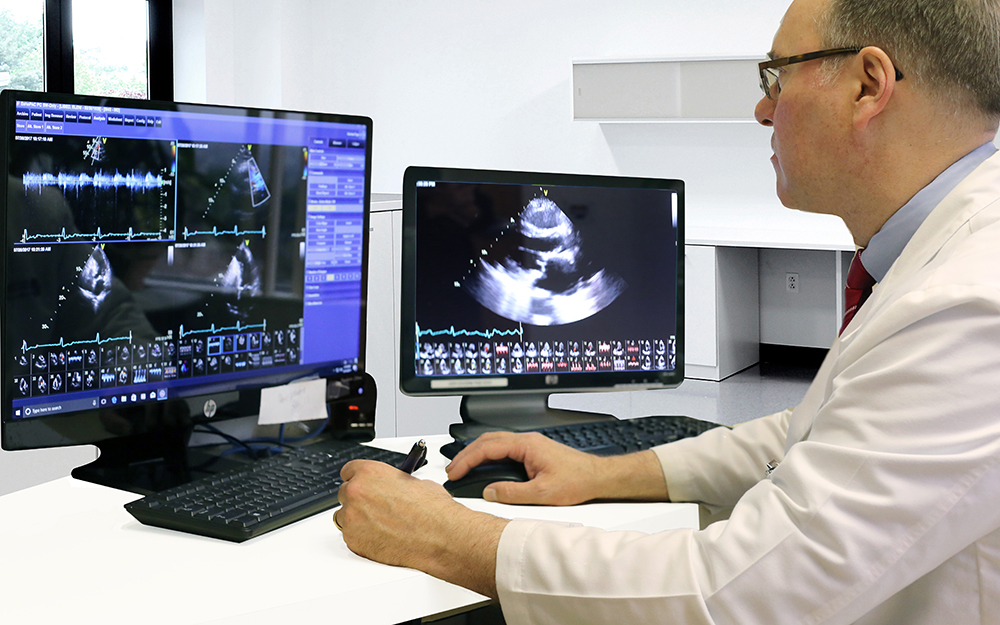
Adult Echocardiography is a diagnostic test which uses
ultrasound waves to make images of the heart chambers, valves and surrounding structures. It can measure cardiac output and is a sensitive test for fluid around the heart (pericardial effusion).
Dr. Brackett is one of only a few cardiologists in our County who holds the honor of adult echocardiography testamur. This requires the completion of a special competence examination to optimize skill in the performance and interpretation of cardiac ultrasound. Cardiology Associates echo lab is accredited with ICAEL.
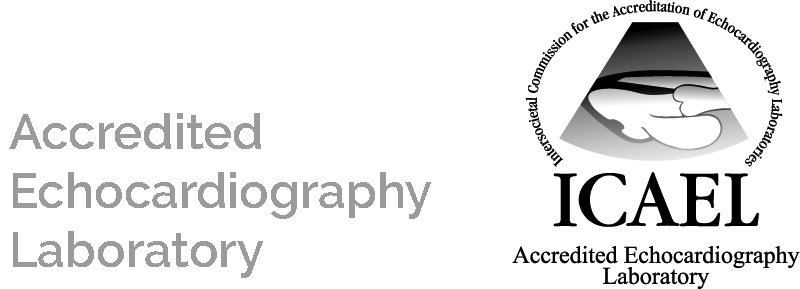
Bubble Study Echocardiogram
Carotid Ultrasound
Venous Doppler Ultrasound
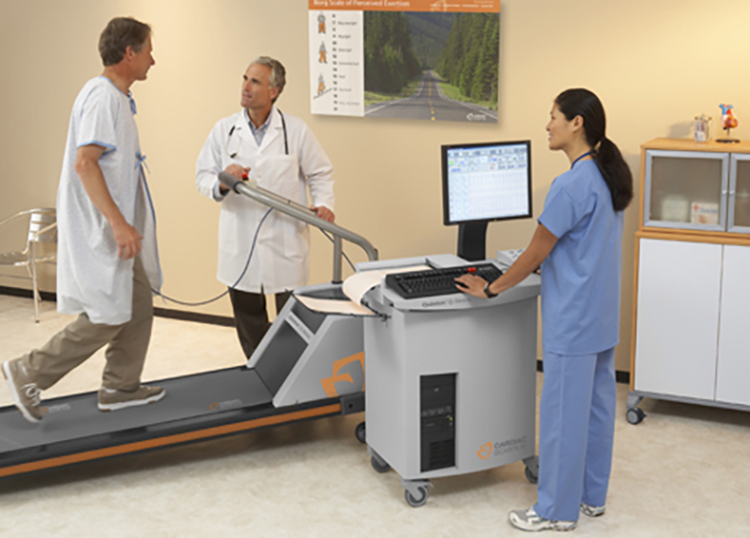
Nuclear Stress Test
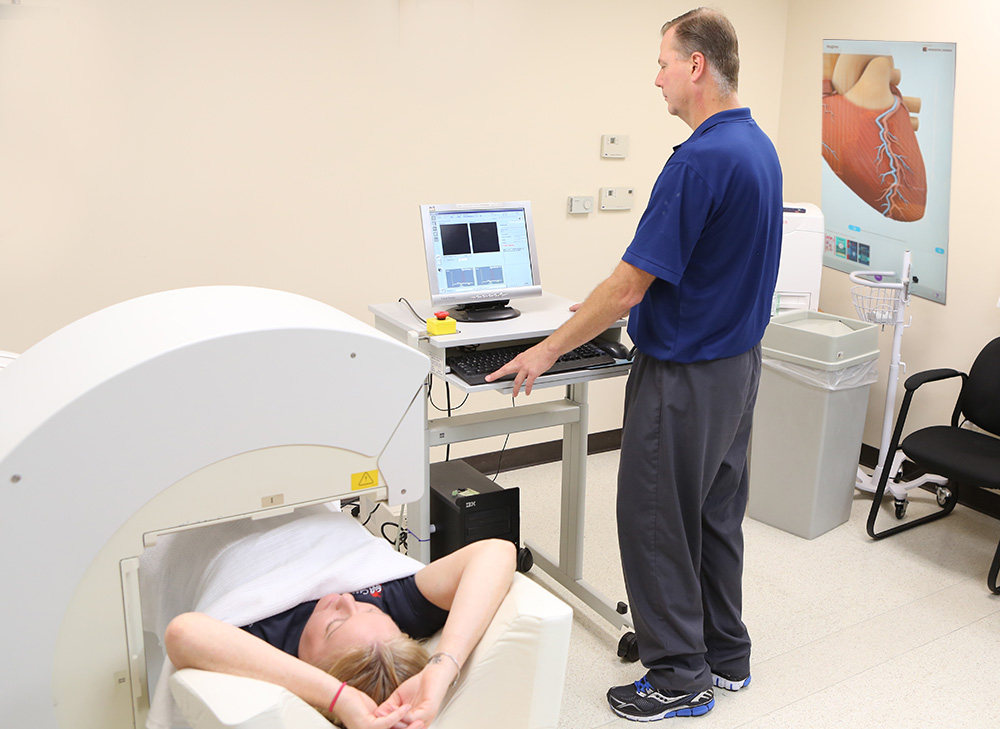
Dr. Steinberg and Dr. Shaun Patel are certified in Nuclear Cardiology.
Event Monitoring
A cardiac event recorder is a battery-powered portable device that you control to tape-record your heart’s electrical activity (ECG) when you have symptoms. There are two types of event recorders: a loop memory monitor and a symptom event monitor. The FDA-cleared ZIO Patch is a small, adhesive, water-resistant one lead ECG sensor that the user can stick onto their chest for a continuous
24-hour monitoring over 2 weeks, but it is only approved on some insurance plans.
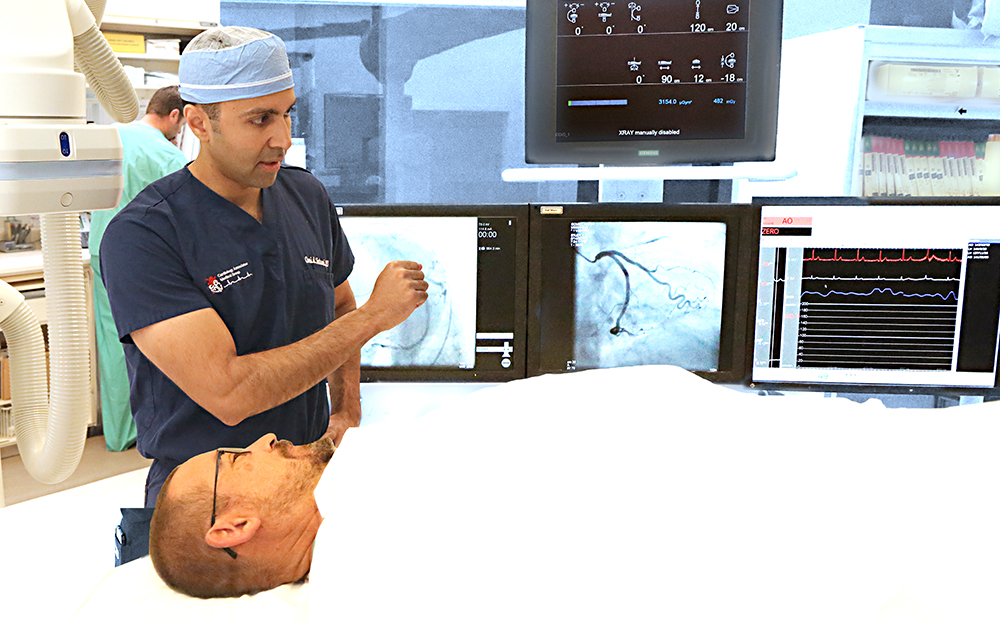
Cardiac Catheterization
Dr. Omid Fatemi is trained in transradial catheterization procedures.
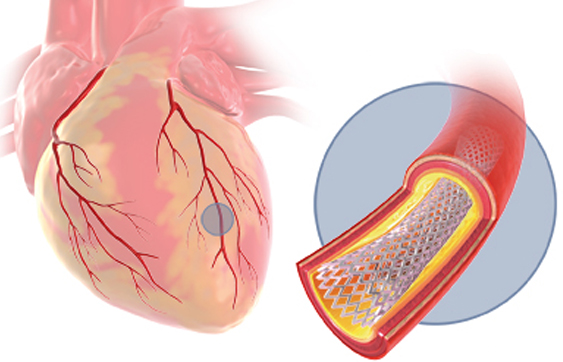
Dr. Shaun Patel and Dr. Omid Fatemi are Interventional Cardiologists at Cardiology Associates.
Dr. Omid Fatemi specializes in this procedure.
PFO Closure
Percutaneous closure is a surgical procedure used to treat patients with patent foramen ovale (PFO) and atrial septal defect (ASD). Advancements in device technology and image guidance now permit the safe and effective catheter-based closure of numerous intracardiac defects, including PFO and ASD.
Dr. Omid Fatemi has been doing these closures at Community Memorial Hospital.
Aortic Valvuloplasty
Aortic Valvuloplasty also known as balloon aortic valvotomy is the widening of a stenotic aortic valve using a balloon catheter inside the valve. The balloon is placed into the aortic valve that has become stiff from calcium buildup.
ASD Closure
Dr. Omid Fatemi have been doing these closures at Community Memorial Hospital.
Peripheral Vascular Intervention
Dr. Shaun Patel and Dr. Omid Fatemi are board certified in endovascular procedures.
Peripheral Vascular Disease
Dr. Shaun Patel and Dr. Omid Fatemi are board certified in endovascular procedures.
Peripheral Angiogram
Peripheral Angiogram is a test that uses X-rays and dye to help your doctor find narrowed or blocked areas in one or more of the arteries that supply blood to your legs. The test is also called a peripheral arteriogram.
Dr. Shaun Patel and Dr. Omid Fatemi are board certified in endovascular procedures.
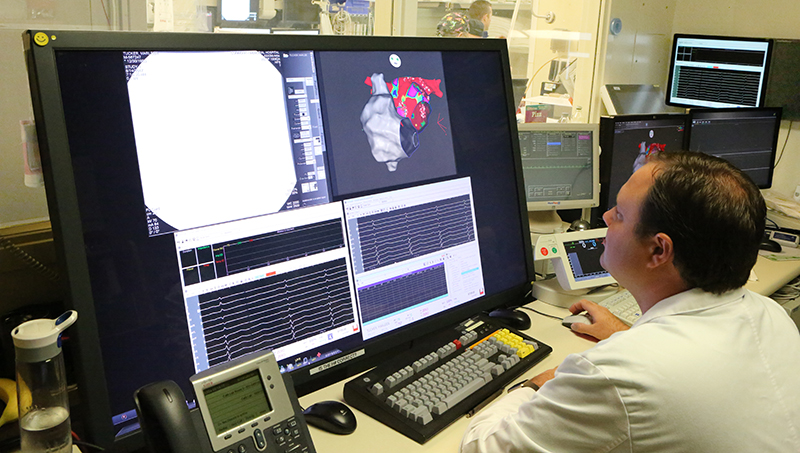
Complex Ablations For A-FIB, A-FLUTTER, VT, SVT, PVC
Pacemaker Implantation
A pacemaker insertion is the implantation of a small electronic device that is usually placed in the chest (just below the collarbone) to help regulate slow electrical problems of the heart. A pacemaker may be recommended to ensure that the heartbeat does not slow to a dangerously low rate.
Dr. Jonathan Dukes and Dr. Shaun Patel perform pacemaker implantation.
Defibrillator Implantation
An Implantable Cardioverter-Defibrillator (ICD) is a cardiac device that is intended for high risk patients to reduce their risk of dying if the lower chambers of the heart (ventricles) go into a dangerous rhythm and stop beating effectively (cardiac arrest).
Dr. Jonathan Dukes perform defibrillator implantation
Watchman Procedure
The Watchman Procedure is among the newest procedures available to prevent
A-fib related stroke.
Dr. Jonathan Dukes and Dr. Omid Fatemiperform the Watchman Procedure.
Pacemaker And Defibrillator
Battery Replacement
A pacemaker battery usually lasts 7 to 8 years. When the battery runs down, a new pacemaker will be implanted. The surgery to replace the old pacemaker with a new one usually requires a local anesthetic. In most cases, your original pacemaker leads will not need to be replaced.
Implantable Monitoring Device
Reveal LINQ, Insertable Cardiac Monitor, is the world’s smallest implantable cardiac monitoring device. The procedure to implant one just takes a few minutes to perform as an outpatient. It records the heart rhythm continuously to capsure recurrent unexplained episodes of palpitations.
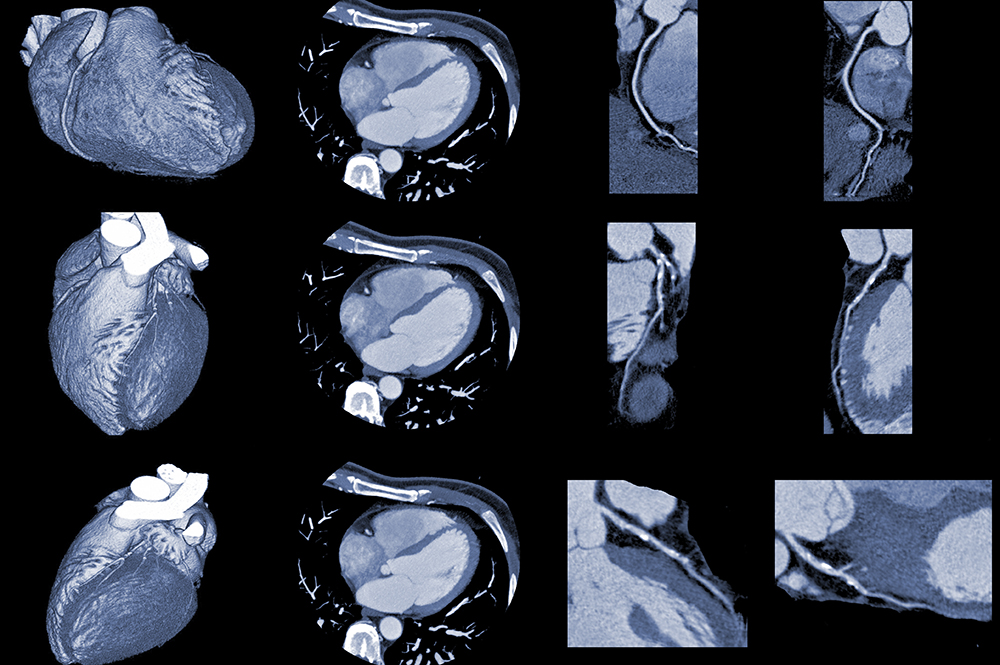
Cardiovascular Computed Tomography (Cardiac CT)
Cardiovascular Computed Tomography (Cardiac CT) – Also known as computed tomography; computed axial tomography scan (CAT scan). A cardiac CT scan is a painless imaging test that uses x rays to take many detailed pictures of your heart and its blood vessels. An electron beam CT scanner also can show calcium in coronary arteries.
Dr. Alon Steinberg is certified to interpret Cardiac CT scans.
- Managing Coumadin/warfarin dosing
- Providing monitoring and patient evaluation
- Providing education
- Communicating with referring physicians to ensure each patient has complete medical care
When administering Coumadin/warfarin, it requires careful monitoring and regulation. At CAMG, we realize how important it is to follow our anticoagulation patients with consistent, accurate care. We have a well trained staff that is experienced in dealing with your questions and care.
Our on-site lab is available during working hours, (8:00 a.m. to 5:00 p.m., Monday through Friday). We use a finger stick method, and your INR results are ready in a couple of minutes. At the time of your protime, you will receive instructions for your dosing and next appointment.
What is Coumadin? A brand name for warfarin sodium. It is used to prevent strokes, heart attacks and blood clots. It must be carefully regulated to maintain safety for patients taking this medication.
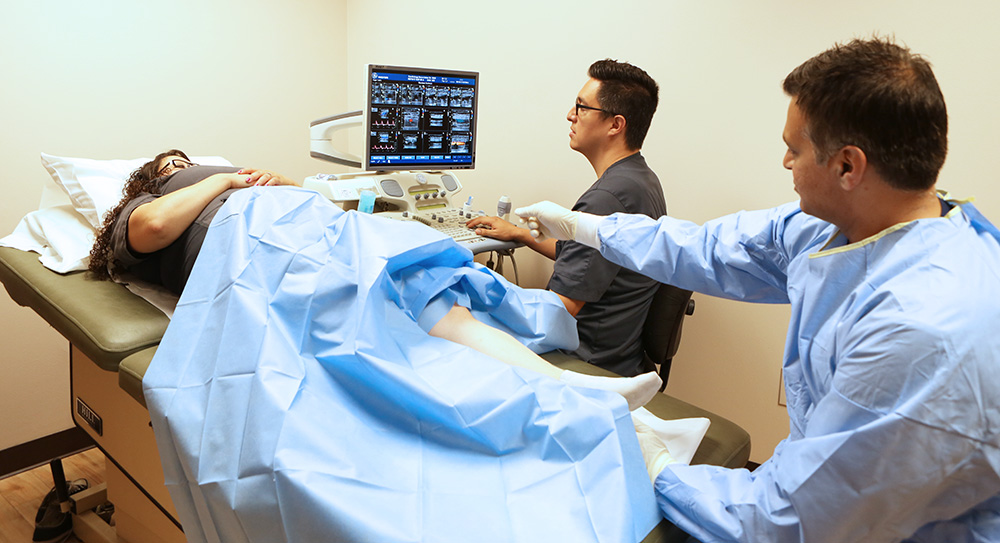
Varicose Veins Treatment
Endovenous Ablation is an image-guided, minimally invasive treatment for varicose veins. It uses radiofrequency or laser energy to cauterize (burn) and close the varicose veins. The results are remarkable. Patients who suffer with painful, disfiguring varicose vein now have the opportunity for a simple procedure with minimal pain.
Our Vein Lab in Oxnard, CA is where we treat patients who meet medically based requirements. Vein ablations are covered by most insurances.
Dr. Shaun Patel and Dr. Omid Fatemi are board certified in endovascular procedures.
